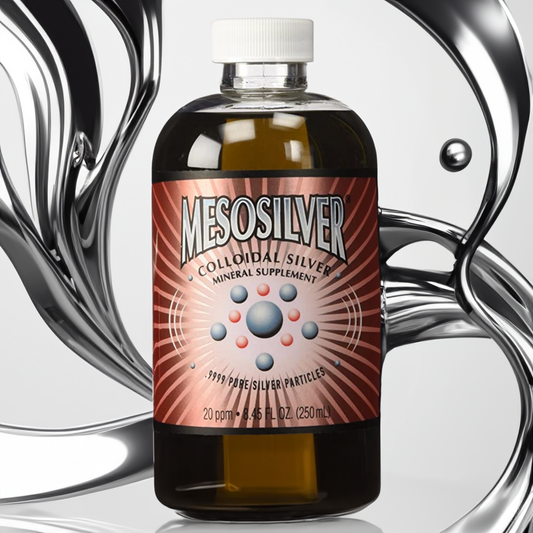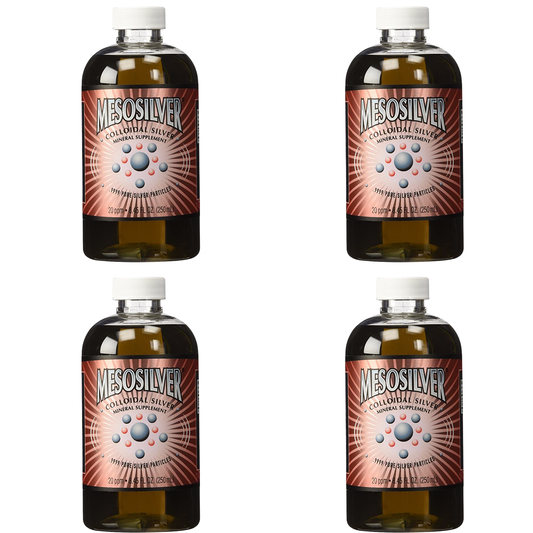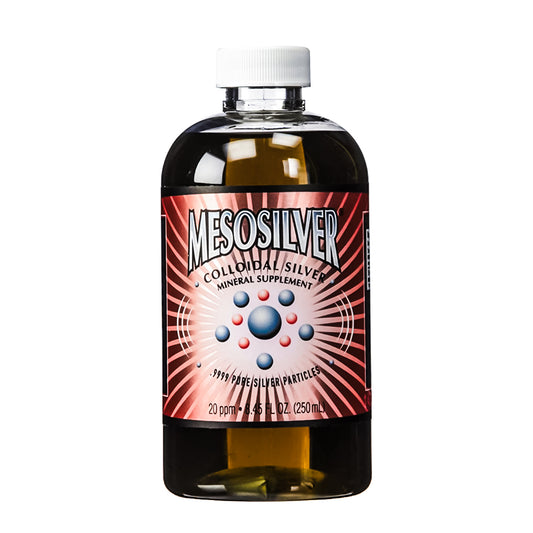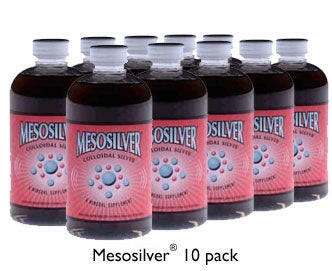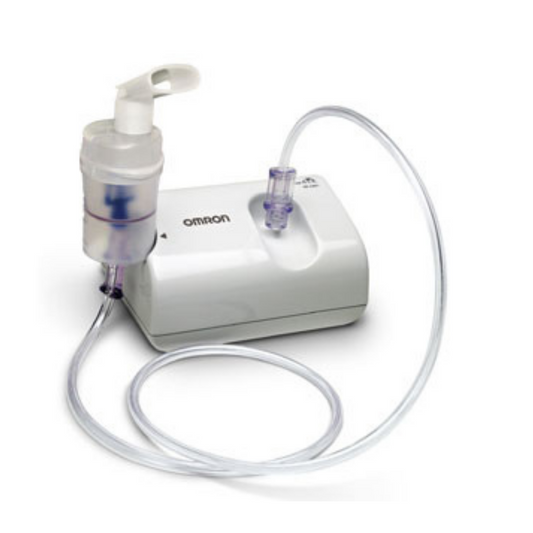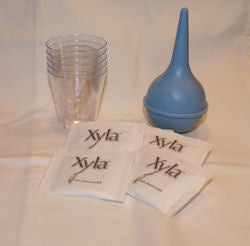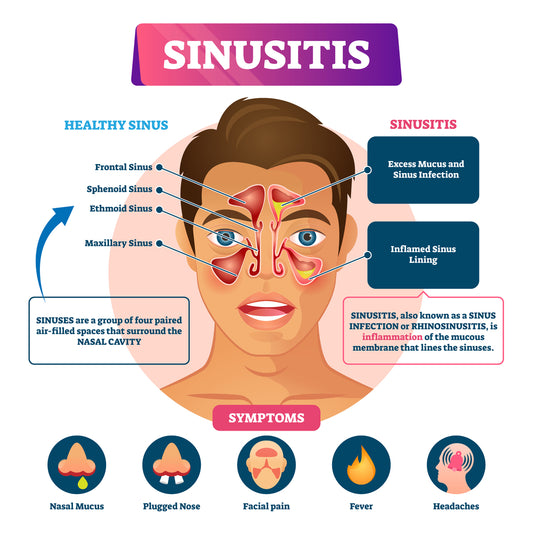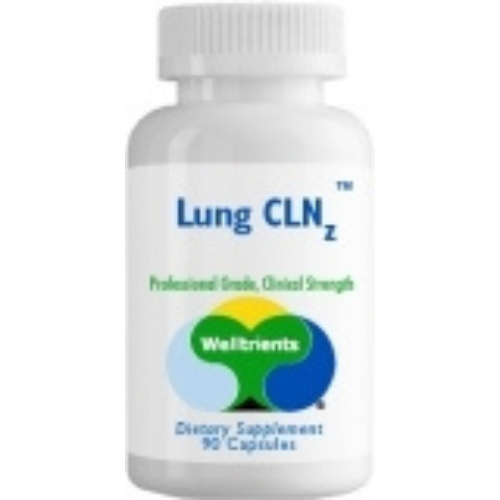Learn about Bronchitis Symptoms!
Mesosilver® Colloidal Silver
Do you feel short of breath, unable to take a deep breath without triggering a vicious coughing spree? Does your chest "rattle" when you are breathing? Do you find yourself coughing up mucus? These may be a few signs that you have developed a case of bronchitis.
Causes of Bronchitis
Symptoms of bronchitis are usually caused by a pathogen causing inflammation of either (or both) the bronchial tubes of the bronchi that connect your lungs to your windpipe. The pathogens can be either a virus or bacteria from a concurrent respiratory infection, as is usually the case with acute bronchitis, or they may be from smoking or other chemical pollutants, which are more likely to cause chronic bronchitis. The pathogens irritate tiny hairs (called cilia) that line the passageways and usually eliminate pollutants, and when the cilia become overwhelmed (by an out-of-control respiratory infection or heavy smoking) they stop being able to function properly. The clogging then causes mucus to build up, creating the signature bronchitis cough, wet with lots of mucus. Other bronchitis symptoms include general ache and fatigue, wheezing or shortness of breath, chest pain, and a low-grade fever. Chronic bronchitis occurs when your symptoms last for at least three months of the year for at least two consecutive years.
If you think you have bronchitis, see your doctor. Bronchitis is very serious and can worsen into pneumonia.
Antibiotics Are Ineffective For Bronchitis
A recent Reuters Health news story quoted Dr. Arthur Evans, an associate chair of medicine at Cook County Hospital in Chicago, Illinois as saying: "Antibiotics don't work for acute bronchitis. Now we have strong evidence saying that it shouldn't be used for this purpose.
Mesosilver Colloidal Silver
Supplement your immune system with Mesosilver, an all natural dietary supplement. Mesosilver is made up of a high concentration of pure colloidal silver particles suspended in sterilized water. The particles are of the smallest size, .65 nanometers, and it's this high quality and small size combined with being highly concentrated that makes it the most effective colloidal silver product on the market. Further, Mesosilver has no drug interactions, meaning it will not interfere with any medications you may currently be taking. It also has no side effects reported from its many users. (Of course, do not take Mesosilver if you are allergic to silver). Mesosilver works to support a healthy immune system function. Drug claims cannot be made for Mesosilver. It is difficult and expensive to conduct the double-blind drug type experiments for dietary supplements that would be required to support any drug claims. However, testimonial reports from customers suggest that Mesosilver is an effective supplement to aide in maintaining good health.
Mesosilver is a true colloidal silver consisting of pure, sterilized water and pure silver particles.
Bronchitis and your Immune System
Your immune system creates antibodies to fight invading pathogens such as those that cause bronchitis. Mesosilver works to support your immune system and can be applied directly with the aid of Omron Nebulizers and by being taken orally to supplement your entire immune system.
Results / Testimonials
“Both my 8-year-old son and I used Mesosilver for bronchitis and had immediate and excellent results. I used the nebulizer once a day for three days and it completely wiped out my symptoms. We had my son do two nebulizer sessions in one day and he was over his symptoms within a day.” --Joe Berti, age 47 - Brown’s Mills, New Jersey
"I had a bronchial infection for about a month that wouldn't go away. I began inhaling the Colloidal Silver through a nebulizer about twice a day and it cleared it right up." - Hal Becker, age 79, Picayune, Mississippi
"For many years I would develop bronchitis every time after catching a common cold. Bronchitis would generally last several weeks, sometimes lasting as long as two months after the cold was gone. There were times in the past when I would go to my doctor for antibiotics to get rid of bronchitis. The next time I got a cold, bronchitis would return. Rather than continually using antibiotics, I tried Mesosilver. I am convinced that the combination of taking a daily supplement of silver and using the nebulizer whenever I feel bronchitis coming on has definitely improved my general health. For the most part, bronchitis is now a thing of the past in my life." - Frank, New Jersey
"Although I know better, I did a foolish thing by working in my workshop without a mask. The wood dust really irritated my lungs and I was coughing quite a bit for days. I tried the Mesosilver in my wife's nebulizer. After using it just twice, the coughing stopped cold!" - Dr. Bill Biagioli, N.MD, Florence, South Carolina
"My husband, who is 66 years old, has had asthma since he was two. His condition has gotten progressively worse over the years. About six years ago he got bronchitis that seemed to settle in and was very hard to get rid of. It would just keep coming back. We've had him on three different antibiotics, all to no avail. The doctor even put him on Diflucan (anti-fungal) and that didn't even help. Finally, we tried him on Mesosilver. We use one teaspoon a day in the nebulizer and it has cleared up his bronchitis. The Mesosilver has really helped him, and I am very, very pleased with the results. We’re still doing daily treatments, and may just keep them up. I’d hate to stop and have bronchitis come back. My husband was also taking about 40 mg of cortisone per day, but we've been able to slowly cut that back to about 5 mg. We’re also going to begin cutting back on the other steroids he's taking. Our hope is to eventually wean him off steroids altogether because they give him tremors." - Irene Perry, San Leandro, CA
Read the following Reuters article concerning the improper use of antibiotics to treat bronchitis:
Popular Antibiotic Is Useless for Acute Bronchitis Fri May 10,10:28 AM ET
By Melissa Schorr NEW YORK (Reuters Health) - Patients suffering from bronchitis who were given a widely prescribed antibiotic did no better than patients who took a low dose of vitamin C, which is known to be ineffective in treating bronchitis, researchers report.
"Antibiotics don't work for acute bronchitis," lead author Dr. Arthur Evans, an associate chair of medicine at Cook County Hospital in Chicago, Illinois, told Reuters Health. "Now we have strong evidence saying that it shouldn't be used for this purpose."
The researchers hoped to test the effectiveness of antibiotics for patients with acute bronchitis. Physicians commonly prescribe antibiotics to treat this condition, but prior studies of whether antibiotics help patients with bronchitis have had mixed results.
At random, the researchers gave 220 patients with acute bronchitis either the antibiotic azithromycin or a dummy pill of low-dose vitamin C, which has been shown to have no effect on bronchitis. The patients were also given standard therapy for bronchitis, including cough syrup and an albuterol inhaler to ease their cough.
The investigators measured whether the patients given the antibiotic showed improvements in their quality of life, such as being able to return to normal activities after a week. The findings are published in the May 11th issue of the medical journal The Lancet.
Evans and colleagues found that after 7 days, the patients are given the antibiotic and those given vitamin C did not differ significantly in their physical improvement and the timing of their return to regular activity.
The patients receiving the antibiotic showed only a slight improvement in coughing and daily activities by the third day of treatment, but those differences disappeared by the seventh day. The authors conclude that antibiotics appear to provide only "transient benefit of little clinical significance," while increasing the risk of side effects and microbial resistance to the medication.
The findings shift the burden of proof to proponents of antibiotics to demonstrate why these drugs should be used in acute bronchitis, the researchers note. In the meantime, Evans suggests doctors should not routinely prescribe antibiotics for bronchitis. "If the condition changes and there's suspicion of pneumonia, the patient should be reassessed," Evans added. "Sometimes pneumonia is misdiagnosed as acute bronchitis." SOURCE: The Lancet 2002;359:1648-1654.

 Sold out
Sold out
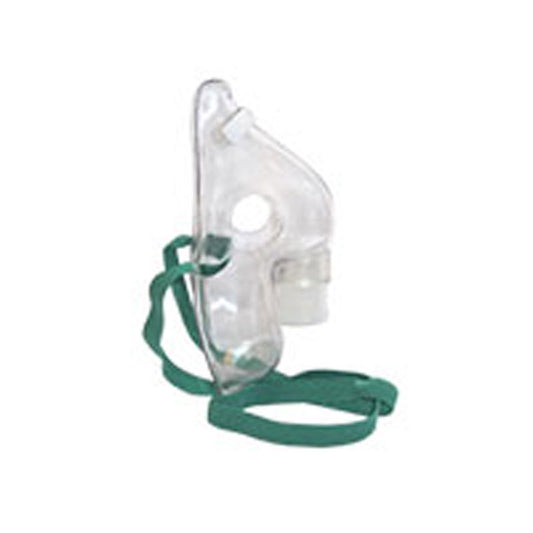 Sold out
Sold out
 Sale
Sale

